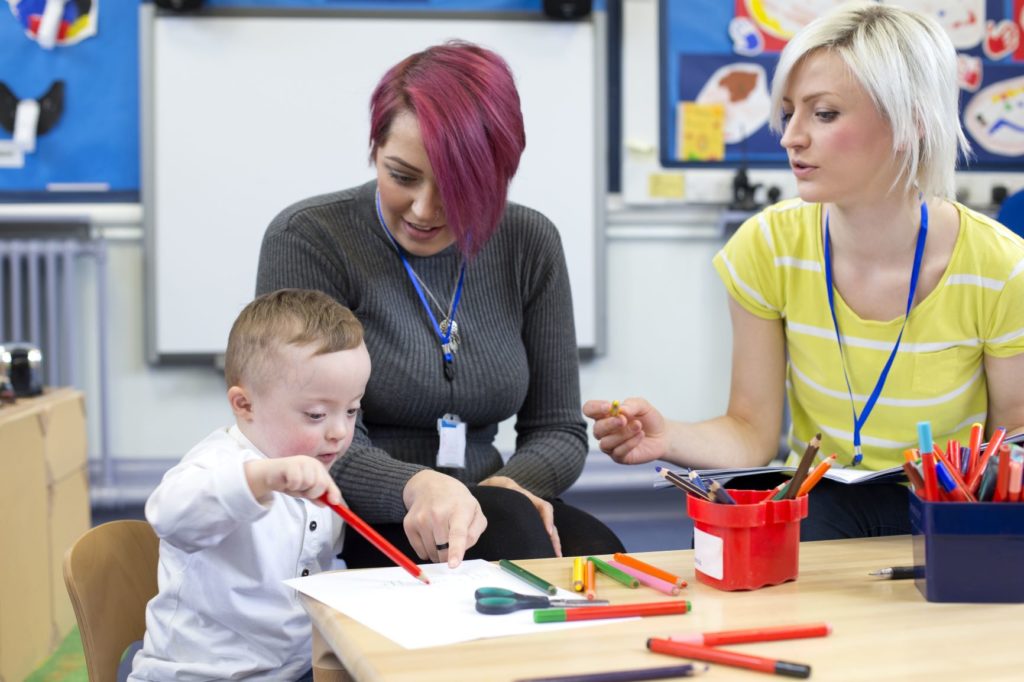
This post was originally published on November 23, 2020, and updated on November 7, 2024, with new information. Staffing a team can be tricky, and child care hiring is no exception. Building an amazing team at your child care center is the key to providing the best possible care for every child and exceeding parents’ expectations. But how do you know which child care roles your center needs?
Let’s take a look at most important job roles and positions that exist within child care centers. For each child care position, we’ll share an overview of roles and responsibilities, most important requirements and qualifications for that role.
Finding Child Care Staff
The 2024 Child Care Management Software Industry Trends Report from Procare Solutions found that 61% of respondents said it’s a challenge to hire and retain staff. The data from the confirms that staffing shortages are affecting centers in multiple ways:

Five Child Care Positions Your Center Needs
Child Care Director / Administrator
Job Description: An outstanding child care center needs an outstanding child care director / administrator. This child care position is indispensable because they ensure the excellence of care at your center. The director/administrator is in charge of child care center management, overseeing all day-to-day operations.
As the leader of your child care center, the child care director / administrator plans the programs of your child care center according to its educational philosophy. With the assistance of other daycare workers and parents, they will plan a high-quality curriculum that adheres to state and federal guidelines. They manage purchasing, oversee child care accounting and set the policies that keep your center running smoothly.
This role is the face of the child care center, acting as a spokesperson to parents and the community. In this capacity, this person will:
- spur family engagement
- lead community outreach
- plan and execute marketing campaigns
- direct external communications
This role is also responsible for hiring, training and supervising all the other child care positions needed for your center’s success. To help deliver an outstanding level of care, they will set employee standards and give evaluations. They must handle all licensing requirements and ensure reporting of child abuse.
Qualifications & Requirements for the Child Care Director Role: Typically a child care director / administrator has an associate’s or bachelor’s degree in early childhood education or a related field, and two to -five years’ experience working in a child care setting. As with all child care workers, they must fulfill local licensing requirements and pass a background check.
Other requirements may include:
- Knowledge of child development theory
- Familiarity with local laws and regulations regarding child care
- Outstanding written and verbal communication skills
- Strong leadership ability
- Administrative and business skills
- Marketing/sales experience
- Crisis management skills
- Valid CPR certificate
Child Care Administrative Assistant
Job Description: A child care administrative assistant performs the duties of both an administrative assistant and a child care worker. A great child care administrative assistant has a strong customer service aptitude to help meet parents’ and children’s needs.
As the initial point of contact, they:
- answer the phone and taking messages
- handle day-to-day communications with parents
- answer questions about your center
- give tours to prospective parents
- greet visitors
- supervise children’s entry/exit at your child care center
The person in this daycare role works closely with the director/administrator on bookkeeping and record-keeping. They will support all staff by arranging meetings, preparing memos and directing communications. Light janitorial duties may be required, as well as ensuring the center is well-stocked and organized.
Depending on the needs of your child care center, the person in this role may take on child care duties such as meal preparation and classroom supervision. They should be ready to stand in for the other daycare positions if necessary due to regular breaks, planned absence or emergency.
Qualifications & Requirements: A child care administrative assistant should have some prior experience working in a child care center, and meet local licensing requirements.
Other skills and requirements include:
- CPR certification
- Organizational abilities
- Prior administrative assistant experience
- Familiarity with computer software
- Office management skills
- Strong written and verbal communication
- Outstanding customer service
Child Care Supervisor

Job Description: A child care supervisor takes on the important roles of both directly caring for children and acting as a leader to other child care workers. They set the standard for their team in implementing the programs and policies of your center.
As a go-between for the child care director and other workers, the child care supervisor coaches and mentors the other child care positions to make sure the standards of the center are being upheld. They serve as the “on-the-ground authority,” making decisions about policy implementation and taking charge in emergencies.
Child care supervisors are developing leaders, meaning they are entrusted with exercising good judgment to remember the purpose of each policy and guideline they help implement. They assist the child care director in maintaining compliance with regulations and center policies. The person in this child care role will also take initiative in identifying potential issues, communicating with parents and guiding other staff toward excellence.
Qualifications & Requirements: A child care supervisor usually has a bachelor’s or associate’s degree in early childhood education or a related field, as well as at least one to-two years of experience working in child care. They must meet child care local licensing requirements and pass a background check.
Other requirements may include:
- Leadership abilities
- Additional coursework in early childhood education
- Knowledge of local laws and licensing regulations
- Familiarity with the principles of child development
- Time management skills
- Creative thinking and problem solving
- CPR certificate and/or other medical training
- Workplace safety certifications
Early Childhood Educator
Job Description: Among the most important child care positions, early childhood educators are teachers who work with young children to educate and care for them according to your center’s guidelines. The educator in this role plans and executes classroom activities to help children form cognitive, emotional, social and physical abilities in a safe, nurturing environment.
One of the key duties of an early childhood educator is maintaining a safe and stimulating classroom. They make sure the room is clean, free of hazards and well-stocked with everything kids will need to play, learn and grow. This includes promoting hygiene and dealing with accidents and medical issues appropriately.
Early childhood educators teach kids basic life skills and guide them through routines like meals, dressing, bathroom use and naps. They familiarize students with letters, numbers, shapes and colors. Reading stories, singing songs, playing games, or doing arts and crafts are examples of fun educational activities an educator may use.
Educators in this daycare role play a pivotal role in early childhood by fostering self-esteem in an inclusive atmosphere. They encourage emotional and social development by providing one-on-one attention and setting behavioral expectations.
They carefully watch children for signs of behavioral or learning problems and track their progress over time. The educator keeps parents up to date by taking written observations of each child and sending home reports.
Qualifications & Requirements: An early childhood educator sometimes has an associate’s degree in early childhood education, as well as at least one-two years of child care experience and is licensed by their local jurisdiction.
Other requirements may include:
- Love of working with children
- Knowledge of child development and education
- Familiarity with local laws regarding child care
- Professional development
- Creativity and outgoing nature
- Strong communication skills
- CPR certificate and background check
- Workplace safety credentials
Early Childhood Education Assistant

Job Description: This child care position is similar to the early childhood educator, and the two work closely together. The early childhood education assistant supports the educator in their duties by helping them care for children and carry out planned activities.
With the guidance of an early childhood educator , the ECE assistant will care for infants and toddlers, engage them in play and participate in educational activities. To help track the development of each child, they will assist supervisors in collecting observations and maintaining records.
The ECE assistant is an important child care role because they will help you maintain ideal staff ratios while saving costs on hiring. A staff supported by ECE assistants can make sure each child can get the individual attention they deserve.
ECE assistants are often in the process of completing their education toward becoming a teacher, so hiring ECE assistants is a valuable mentorship opportunity for your center and provides a candidate pool for future teachers. Some ECE assistants specialize in specific areas, such as working with disabled children, which can add extra value to your center.
Qualifications & Requirements: A high school diploma is required, typically along with some coursework in early childhood education and meets all local licensing requirements.
Other qualifications may include:
- Love of working with children
- Basic knowledge of child development
- Creativity and outgoing nature
- Strong communication skills
- CPR certificate and background check
Manage Your Child Care Staff with Procare Solutions

Are you feeling the weight of burnout in your career as an ECE professional? You’re not alone!
Many in our field face the challenge of balancing the demands of their work with personal well-being. Check out this free infographic with tips on stopping staff burnout in ECE professionals and learn how Procare can help!




